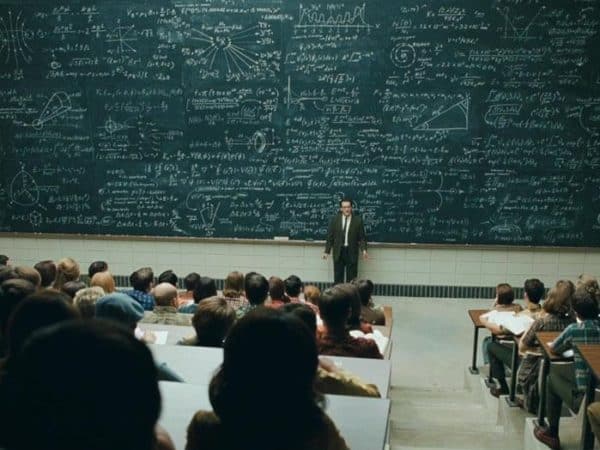Are physicists afraid of math?

 Details, details… It may come as a surprise but even physicists with years of training in advanced mathematics are put off by mathematics, as they tend to shy away from equation-heavy scientific papers, according to a recent study.
Details, details… It may come as a surprise but even physicists with years of training in advanced mathematics are put off by mathematics, as they tend to shy away from equation-heavy scientific papers, according to a recent study.
Along with making the job of grade school math teachers a perennial challenge, the fear of mathematics or arithmophobia is something which can afflict any number of us, including those often with decades of training in math.
The result is confirmed in a new study by Drs. Tim Fawcett and Dr Andrew Higginson from the University of Exeter’s Center for Research in Animal Behaviour, who performed a statistical analysis on 2,000 physics papers published in a reputable academic physics journal. The researchers found a significant inverse correlation between the number of equations in a given article and the likelihood that it would be referenced by other physicists in their own articles (an indicator of how well read a particular article might be).
Aside from showing, perhaps against opinions to the contrary, that physicists are human too, the results indicate that the fear of math (or, at least, the annoyance with having to read too many equations) is something that cannot be definitively erased simply by having more and more training in mathematics, as physicists are among the most highly trained in that capacity.
The problem is not limited to the field of physics, either, say Fawcett and Higginson, who earlier arrived at a similar conclusion about math-heavy papers in the fields of ecology and evolutionary biology. The authors claim that in order to avoid being avoided, authors of academic papers need to cut down on the equations and try to get their ideas across in simpler language.
Ultimately, say the authors, it’s up to the scholars themselves to do better at communicating their work, even to an audience of their peers. “Ideally, the impact of scientific work should be determined by its scientific value, rather than by the presentational style,” says Dr Higginson, whose new work is published in the New Journal of Physics. “Unfortunately, it seems valuable papers may be ignored if they are not made accessible. As we have said before: all scientists who care about the dialogue between theory and experiment should take this issue seriously, rather than claiming it does not exist.”
Interestingly – and with more than a pinch of irony – the authors’ new study was itself spurred on by a 2015 critique of their work, one which charged Fawcett and Higginson with using unreliable statistics to reach their conclusion. Thus, for those of us keeping track, here we have one group of academics using math to counter the math-based conclusions of another group of academics, who themselves were claiming (by using math) that problem #1 in academia is math. Oh boy!
The fear of math and education in mathematics have been a constant topic of debate. In Canada, the release in 2013 of the OECD’s rankings of school-aged children’s abilities in math, reading and science proved a cause for concern, as Canada fell out of the top ten ranked countries for math and landed in 13th place overall. The result has been blamed in some quarters on the way math is taught in schools, where in general a discovery-based approach has taken over from the more old-fashioned rote memory method of learning.
Authors note: No equations were harmed during the writing of this article.

